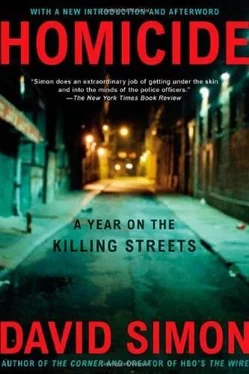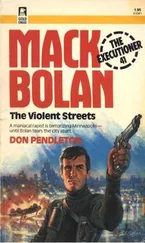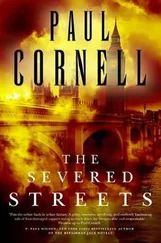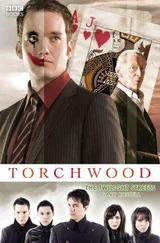“Never mind that, Gene,” says Gersh, a veteran prosecutor who has been through this wait a hundred times. “They’ve turned the corner. They’re coming around.”
Cassidy smiles at the thought. As if to lighten his mood, he asks permission to tell his joke.
“Which joke is this?” asks Belt.
“You know,” says Cassidy. “My joke.”
“Your joke? The one you told before?”
“Yeah,” says Cassidy. “That one.”
Belt shakes his head, smiling. “What do you want to do, Gene? Clear the room?”
“What the hell,” says Biemiller, another Western man. “Tell the joke, Gene.”
Cassidy launches into an unlikely tale of three pieces of string standing outside a barroom, all of whom are thirsty and in want of a beer. A sign on the door says no string will be served.
“The first piece of string goes into the bar and orders a beer,” explains Cassidy, “and the bartender says, ‘Hey, are you a piece of string?’”
The string answers in the affirmative and is escorted from the premises. Some of the cops offer loud, audible yawns. Ignoring them, Cassidy recounts the plight of the second piece of string, which happens to be markedly similar to the first.
“So then the third piece of string rolls around on the ground and ties himself up and gets all messed up before going into the bar, right?”
McLarney wanders in from the hallway, just in time for a punch line he can’t possibly understand.
“And the bartender asks him, ‘Are you a piece of string?’ And the string says, ‘ ’Fraid not.’”
Groans all around.
“Christ, that’s a terrible joke, Gene,” says one of the Western men. “Even for a blind guy, that’s a terrible joke.”
Cassidy laughs. Inside the jury assembly room the tension is gone, the pall of defeat lifted suddenly by the jury forewoman’s casual question. McLarney, too, is relieved, though the idea of a second-degree verdict still doesn’t sit well. As Cassidy launches into another joke, McLarney wanders back into the corridor and slumps onto a hallway bench, his head resting against the cold marble wall. Belt follows him out.
“Butchie’s going to prison,” says McLarney, as much to hear himself say it as for any other reason.
“We need first-degree, bunk,” says Belt, leaning over the bench. “Second-degree don’t cut it.”
McLarney nods in agreement.
Upon the arrival of the forewoman’s note, Gersh and Schenker immediately withdrew any and all plea offers. Judge Bothe tells the prosecutors in her chambers that she’s ready to take a second-degree finding right now if the jurors are unanimous.
“No,” says Gersh with a trace of anger. “Let them do their job.”
The deliberations stretch to more than eight hours, and it is closing on 10:00 P.M. when the courtroom reconvenes and Butchie Frazier is returned from the basement lockup. Cassidy sits in the front bench with his wife, directly behind the prosecutors. McLarney and Belt find seats in the second bench, closer to the door. The jurors come downstairs silently. They do not look at the defendant-a good sign. They do not look at Cassidy-a bad sign. McLarney watches them settle into the jury box, his hands gripping the crease of his pants at both knees.
“Madam forelady,” asks the clerk. “Have you reached a unanimous verdict on the charge of attempted murder in the first degree?”
“Yes we have.”
“How say you to that charge?”
“We find the defendant guilty.”
Gene Cassidy nods slowly, gripping his wife’s hand, as each juror is polled and the Western uniforms give up a soft cheer from the gallery. Several jurors begin to cry. From the trial table, Gersh turns around to scan the crowd, then gives McLarney a thumbs-up sign; McLarney smiles, shakes Belt’s hand and then pumps a fist in the air and leans forward, exhausted by the moment. Butchie Frazier shakes his head, then begins a careful examination of his fingernails.
As Bothe sets a sentencing date and then concludes the proceedings, McLarney is out of his seat and moving toward the hallway, hoping to grab a juror or two and find out what the hell happened up in that room. Near the top of the stairs, a black juror, a younger woman still trying to control her tears, looks at the badge and shrugs off his question.
“I don’t want to talk about it,” she says.
McLarney moves on and catches one of the three white jurors; he recognizes her as the girl who was crying during Cassidy’s testimony.
“Miss… miss.”
The girl looks back.
“Miss,” says McLarney, catching up. “I was one of the investigators in the case and I was wondering what happened with the jury.”
The girl nods.
“Could I talk to you for a few minutes?”
Reluctantly, the girl agrees.
“I was the lead investigator,” McLarney tells her, a little embarrassed at the intensity he can in no way conceal. “What was it that hung you all up for so long?”
The girl shakes her head. “A lot of them didn’t care. I mean not at all. It was crazy.”
“They didn’t care?”
“Not at all.”
“What didn’t they care about?”
“The entire thing. They didn’t care about any of it.”
McLarney is stunned. Bombarding the young girl with questions, he begins piecing together eight hours of rancorous debate in which race and indifference played dominant roles.
The girl explains that two of the three white jurors argued from the beginning for a first-degree verdict, just as two of the younger black jurors had insisted on acquittal, contending that the police had put every witness up to testifying in an effort to convict someone-anyone-of shooting a white officer. That, they explained, was why all the police were sitting in court. Frazier’s girlfriend had cried because she had been forced to lie. The other two witnesses were probably drunk, coming from the bar. The kid from the city jail testified because he had cut a deal for himself.
The girl remembers that a younger black juror declared at one point that she didn’t like police, which prompted another juror to ask what that had to do with anything. I just don’t like them, the first juror replied, adding that anyone who lived in her neighborhood wouldn’t like them either.
The other eight jurors offered little opinion except to say that they would vote for whatever was agreed upon, the young girl tells McLarney. It was Friday, they pointed out, and the beginning of the Memorial Day weekend. They wanted to go home.
McLarney listens in amazement. “What brought you all around to first-degree?” he asks.
“I wasn’t going to budge and that other woman, the one in the back row, she wasn’t going to change her mind either. She was for first-degree from the very beginning, too. After a while, everyone wanted to go home, I guess.”
McLarney shakes his head, incredulous. He has been a cop long enough to know that there is no understanding juries, but this is somehow more than he can take. The man who tried to kill Gene Cassidy has been given the right verdict for the wrong reasons.
The girl seems to read his mind. “I swear,” she says, “if that’s the way the system works, you can have it.”
Two hours later at the Market Bar, the beer gets good to McLarney and he asks the girl to tell him the whole sordid story again. The girl obliges. A nineteen-year-old waitress at a downtown sports bar, she came to the Market with the cops and prosecutors and the Cassidy family at McLarney’s insistence. She was a hero, he told her, and she deserved a beer. He listens to her alone for a few minutes, then begins calling over others from the Western to add to the audience.
“Vince, c’mere.”
Moulter walks over from the bar.
“This is Vince Moulter,” he says to the young juror. “He worked with Gene. Tell him the part about how the one juror said she thought Butchie was cute.”
Читать дальше












